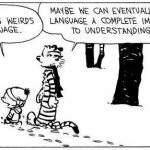As a content strategist I’m often responsible for editing my colleagues writing. Some people assume this makes me the language police. But there’s a fine line between creating consistency and stopping evolving language.
Let’s explore what a content strategist should do, if we are not the English police.
What is “Proper” English
Do you get angry when people write “gotta”? Do verbified nouns make your skin crawl? Did you die a little inside back when the OED named “unfriend” the word of the year?
It’s easy, and (let’s admit) a little fun to feel self righteous in our knowledge of “proper English”. But it’s also based in bias. For one thing, “proper English” has been defined for centuries by a group of white people, ignoring proper ways that black people speak. For another, it ignores the simple fact that English is a constantly evolving language.
To be completely transparent, I must admit that I’m a recent convert. I love language, and I love being right. So being a “grammar nazi” gave me a thrill. But I’ve learned better. One thing that’s helped is reading the book The Mother Tongue: English & How it Got That Way.
English is an Evolving Language
Caveat: I can’t wholly recommend this book. Bryson is an op-ed writer, and his book reads like one. He alternates between facts and opinion-stated-as-fact. It is at times a love letter to English, and at times a review of the history of the language. Most of all, it assumes that the reader, like Bryson, is educated in a specific way, with specific beliefs. He pokes fun at certain words with an assumption that we’ll laugh with him, and is squeamish about naming female genitalia, but has no problem with the male parts.
But the facts… oh, the facts are wonderful. Did you know that “prove” once meant to test, such that “the exception that proves the rule” meant an exception would test the rule, not that there needed to be an exception for the rule to be true? Suddenly the phrase makes so much more sense! And linguists have identified how many words are pronounced in large part through reading poetry, and seeing what words rhymed! And “knight” was once pronounced “kuh-nig-it”, explaining the rationale for that silent k and proving Monty Python right after all.
After 15 chapters of fun facts and history on the language, Bryson reasons:
“One of the undoubted virtues of English is that it is a fluid and democratic language in which meanings shift and change in response to the pressures of common usage rather than the dictates of committees. It is a natural process that has been going on for centuries. To interfere with that process is arguably both arrogant and futile, since clearly the weight of usage will push new meanings into currency no matter how many authorities hurl themselves into the path of change.”
Bill Bryson, The Mother Tongue: English & How it Got That Way
So, if we are not keepers of the language, what do we do?
What is the Role of the Content Strategist?
If we’re not here to correct peoples’ grammar and phrasing, what should we do? Well, we are here for consistency. But a content strategist can’t assume there is a clear right and wrong. I believe this is where Bryson errs. For even as he says that English is constantly evolving, he speaks about right and wrong.
As content strategists we are not here to make people speak and write “correctly”. We are here to create a brand (or product) voice and use that voice. This is why guidelines and standards are so important. Documentation outlines what our voice sounds like and what people need to do to ensure consistency.
Our job is to create thoughtful, user-centric language. We create clear, meaningful guidelines. And then we create consistent language that communicates effectively with our audience.


